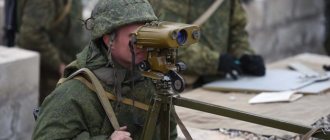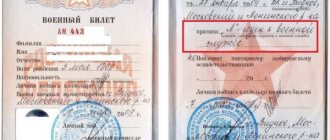After the young man is served with a summons, he is obliged to appear on the specified date at the military registration and enlistment office to undergo a medical examination. Next, according to the conclusion of the commission members, the conscript is assigned to one of the categories of fitness for the army and is presented with a military ID, in one of the sections of which a fitness mark will be written.
Most guys, after reading the entry number, cannot explain what it means. You can ask the relevant question to the staff of the Military Commissariat, but it is unlikely that you will be able to get a detailed answer. So, article 20 b in the military ID of the future soldier, what does this entry say? A detailed transcript is later in the article.
Article 20a and 20b in the military ID
A more detailed explanation of this mark and the corresponding diagnosis can be read in the special state decree “On military medical examination”. Having studied it, it will become known which diseases belong to the subgroups of the article.
Mark 20a includes all possible forms of development of mental retardation in a young person. In official medicine, there are three types: deep, severe and moderate. In the case when, during the examination of the conscript by a specialized specialist, during communication with the guy, the manifestations of the pathology are clearly expressed, additional examinations are not prescribed. After a medical examination, the young man, in any case, will be declared unfit for military service and will be assigned fitness category “D”.
Article 20b in the conscript’s military ID will say that deciphering the disease is not so simple for members of the military medical commission. To determine the intellectual retardation coefficient, which is within the range of 50 to 69 units and is considered a mild degree of insufficient mental development, additional diagnostics are necessary. Only after a complete examination of specialists in a hospital can one accurately determine the patient’s health status and his possible reactions to situations during military service.
After being identified for additional examination, the guy is under the supervision of doctors at the medical institution for 14-20 days. During this time, doctors conduct the necessary research, surveys, dialogues, tests, with the help of which the value of the mental retardation coefficient is determined.
This diagnosis is necessary in order to fully reveal the presence of one or another form of pathology in a recruit and to observe his behavior and reaction to non-standard situations associated with military service. Then make an objective conclusion.
Article 20. Training of citizens under military training programs in military training centers
1. A citizen who does not have citizenship (nationality) of a foreign state or a residence permit or other document confirming the right of permanent residence of a citizen in the territory of a foreign state, who has not reached the age of 24 years, studying full-time at a federal state educational organization of higher education, fit for military service for health reasons and meeting the requirements established by this Federal Law for citizens entering military service under a contract, has the right to conclude an agreement with the Ministry of Defense of the Russian Federation on training at a military training center at this educational organization under a military training program for military service under a contract in military positions to be filled by officers, and on further military service under a contract after receiving higher education. A citizen studying at a military training center at a federal state educational organization of higher education under a military training program for military service under a contract in military positions to be filled by officers is paid at the expense of the federal budget an additional scholarship, differentiated depending on the level of his performance in the specified program, as well as other payments in the manner and amount determined by the Government of the Russian Federation.
2. A citizen who has entered into an agreement provided for in paragraph 1 of this article is obliged, immediately after receiving higher education, to enter into a contract for military service with the Ministry of Defense of the Russian Federation or another federal executive body in which this Federal Law provides for military service, in accordance with subparagraph “e” of paragraph 3 of Article 38 of this Federal Law. In case of refusal to conclude a contract for military service, the citizen shall reimburse, in accordance with paragraph 3 of this article, the federal budget funds spent on his training at the military training center at the federal state educational organization of higher education. In this case, the specified citizen is subject to conscription for military service in accordance with this Federal Law.
The Ministry of Defense of the Russian Federation or another federal executive body in which this Federal Law provides for military service, immediately after a citizen receives higher education, enters into a contract with the said citizen for military service in accordance with subparagraph “e” of paragraph 3 of Article 38 of this Federal Law and assigns him the military rank of officer.
3. A citizen studying under a military training program for military service under a contract in military positions to be filled by officers, expelled from a military training center at a federal state educational organization of higher education for violating the charter or internal regulations of the educational organization or not concluding a contract for training military service in accordance with the agreement provided for in paragraph 1 of this article, reimburses the federal budget funds spent on his training at a military training center and calculated in the manner determined by the Government of the Russian Federation. The condition for the reimbursement of funds specified in this paragraph, as well as the amount of funds to be reimbursed, is included in the agreement provided for in paragraph 1 of this article.
4. A citizen who does not have citizenship (nationality) of a foreign state or a residence permit or other document confirming the right of permanent residence of a citizen in the territory of a foreign state, who has not reached the age of 30 years, studying full-time at a federal state educational organization of higher education, fit for military service or fit for military service with minor limitations due to health conditions, meeting the professional and psychological requirements for specific military specialties, and having passed a competitive selection at the Ministry of Defense of the Russian Federation, has the right to conclude a training agreement with the Ministry of Defense of the Russian Federation at the military training center at the federal state educational organization of higher education under the military training program for reserve officers, the military training program for sergeants, reserve foremen, or the military training program for soldiers and reserve sailors.
The agreement provided for in paragraph one of this paragraph cannot be concluded with a citizen who has an unexpunged or outstanding conviction for committing a crime, as well as with a citizen who is subject to criminal prosecution.
5. A citizen who has not concluded the agreement provided for in paragraph 4 of this article cannot study at a military training center at a federal state educational organization of higher education.
5.1. A citizen studying under a military training program for military service under a contract in military positions to be filled by officers, or under a military training program for reserve officers, a military training program for sergeants, reserve foremen, a military training program for soldiers, reserve sailors, is required to report in writing to the military training center at the federal state educational organization of higher education on the termination of citizenship of the Russian Federation or the acquisition of citizenship (nationality) of a foreign state or obtaining a residence permit or other document confirming the right of permanent residence of a citizen in the territory of a foreign state, on the day when he became is aware of this, but no later than five working days from the date of termination of citizenship of the Russian Federation or acquisition of citizenship (nationality) of a foreign state or receipt of a residence permit or other document confirming the right of permanent residence of a citizen in the territory of a foreign state.
If the citizenship of the Russian Federation of the citizen specified in paragraph one of this paragraph is terminated, or he has citizenship (nationality) of a foreign state or a residence permit or other document confirming the right of permanent residence of a citizen in the territory of a foreign state, he is subject to expulsion from military training center at the federal state educational organization of higher education. Moreover, if such a citizen has citizenship (nationality) of a foreign state or a residence permit or other document confirming the right of permanent residence of a citizen in the territory of a foreign state, he is subject to conscription for military service in accordance with this Federal Law.
6. Admission of citizens for training in military training centers at federal state educational organizations of higher education is carried out in the manner determined by the authorized federal executive body.
7. Training of citizens in military training centers at federal state educational organizations of higher education according to military training programs is carried out in the manner determined by the authorized federal executive body. These programs may provide training for female citizens.
8. Male citizens studying in military training centers at federal state educational organizations of higher education under military training programs undergo training camps (internships) provided for by the specified programs in military educational organizations of higher education, military training units (formations), other military parts. The specified training camps (internships) are equivalent to military training.
9. The Ministry of Defense of the Russian Federation, in agreement with the federal state educational organization of higher education, selects and sends military personnel for the appointment of teaching staff of a military training center at this educational organization to non-military positions. These military personnel may be assigned to non-military positions without suspending their military service.
The future of a person with such a mark
To understand what negative consequences Article 20b entails, a detailed consultation with a specialist is not necessary; it is enough to simply know what pathology the entry indicates. Such a mark threatens the conscript with the following troubles:
- A man liable for military service does not have the opportunity to obtain permission to drive any vehicle. When trying to obtain a car license, the holder of Art. 20b in his military ID will not even give permission to undergo a medical examination;
- A person receives a complete ban on carrying weapons and is deprived of the opportunity to obtain a permit for this. Any physician can easily imagine what consequences the use of weapons by mentally retarded people may entail;
- If someone who has left the army hopes to someday find a job in the Federal Security Service, the Ministry of Internal Affairs or the Ministry of Emergency Situations, he will be greatly disappointed. The only exception is technical personnel;
- A repeated attempt to enlist in one of the country's military units is impossible;
- Guys with such an article on their military ID will not be accepted to study at a higher educational institution, much less in prestigious specialties.
All of the above applies to those guys who deliberately try to avoid military service and do not think about the consequences. Conscripts who have Article 20b written into their military ID, and who actually suffer from such a serious illness as mental retardation, are unlikely to think about working in government agencies or driving a car. For them, these restrictions are insignificant, unlike healthy young men. This category of young people, years later, may change their attitude towards military duty, but getting rid of this kind of mark is not so easy.
What are Article 20(a) and 20(b)?
Articles 20 (a) and 20 (b) are spelled out in the “Schedule of Diseases” and are strictly regulated by military law. These points describe such a terrible disease as “mental retardation.” Naturally, the diagnosis is non-conscription and such a young man is entitled to a deferment from the army.
The article has two subparagraphs. Let's try to figure out what each of them means.
Article 20 subparagraph “A”. The article indicates a severe degree of functional impairment, which may be moderate or severe.
Article 20 subparagraph “B”. This item indicates an easily manifested mental retardation of the conscript.
Each of these articles indicates serious deviations from the norm. Often, a person who has this diagnosis is significantly different from healthy people. It is revealed by disturbances in consciousness and perception of the world. In addition, the first symptoms can be judged even by the appearance of the person liable for military service. In view of this, the service of such a conscript in the armed forces is impossible.
Is it possible to remove the article?
Experts have repeatedly said that it is impossible to remove Article 20. This is because it is attributed in the military ID to men with serious mental disorders, in this case, mental retardation. But some young people still go to certain lengths to get rid of the problematic mark. For example, they allegedly accidentally lose their military ID, after which they go through the procedure of getting it restored. It indicates the category of suitability without specifying the article. But you need to understand that this mark will still remain in other documentation.
Is it possible to change or remove an article?
Experts say that it is impossible to remove the clause, because it is prescribed to young men with serious mental disabilities, in particular, mental retardation.
But there are guys who take risks to get rid of the mark to prevent problems. For example, this happens like this: they deliberately lose a document and restore it through the appropriate authority.
If a young man requires a “normal” military ID without a noted mental illness, the article must be removed. This requires several steps:
- Write a statement asking to appear for an additional or repeat examination. The appeal is often sent to the head physician of the psychiatric dispensary.
- Go to the hospital.
- Conduct a full examination.
To change “mental retardation” to another item number 14, you need to undergo a re-examination. If a young person can prove to the doctor that he is mentally healthy, then there is no need to make other notes. It is better to ask for a replacement document due to the loss of the old one. But this action is illegal
.
To remove the twentieth paragraph, the law requires you to do the following (step by step):
- Get good mental health reports from different places, for example, from an educational institution: school, college. It’s good if there are awards and there was no lag in the learning process, work activity, and there were no complaints from organizations.
- When contacting a local specialist, explain that the disease is not a cause for concern (meaning that the request was a long time ago). Provide the doctor with copies of the report. If the doctor refuses to accept you, then you need to write an application to provide an extract from the medical record to the head physician. It’s good to review and check the symptoms of the assigned diagnosis yourself, and also read reference books on psychiatry. They can remove the pathology. When searching for information, take into account the assigned disease, which must necessarily be contained in the reference book.
- Choose a psychiatric institution to remove the conclusion, make an appointment and come to the appointment, explaining the situation. Provide a written agreement for the help of a psychiatrist under Part Two, Article Three of the Federal Law on Assistance to Citizens. If you refuse, start communicating with the medical institution in the form of a letter. Submit an application requesting an inspection by a medical commission to the chief doctor with personal consent. It is possible to challenge the work of specialists through an application. If the chief doctor of the medical institution does not take action, then go to court under Chapter 25 of the Code of Civil Procedure.
- Now go through a medical examination, but it’s better to talk less about your health. There are fewer complaints about sleep, pain and other conditions. Behavior must be responsible.
- After passing the commission, the doctors will remove the conclusion or confirm it.
- Go to the military registration and enlistment office, ask to correct the article and change the eligibility category.
Which fitness category corresponds?
A citizen who has completed military service must receive a military ID, which is the main document of a military member in the reserve.
It has a fitness category “A” or “B”. There is space left in the notes on the results of the medical examination, because The young man has already served in the army and there is no need to present pathology.
If we talk about a person of military age, then item 20b, which is on the military ID, can be characterized as category “D”.
This means that a citizen does not have the opportunity to serve in the army.
Sometimes a young person is not given a complete ban, i.e. category "B".
In this case, the category “limitedly suitable” is prescribed.
What could be the consequences in the future?
“Mental retardation” is a dangerous diagnosis that is both good and bad news.
For conscripts who do not want to serve in the army and have a mental illness, this article is suitable.
But being marked has negative consequences, for example, you cannot get a good job.
A serious position requires a complex task.
Other consequences:
- A conclusion with 20b threatens that the young man will not be able to pass his driving license for any type of transport. At the first examination, the citizen is not allowed to undergo further commission examination;
- The ban applies to the ability to possess weapons;
- It is prohibited to work in government agencies. authorities, for example, the Ministry of Internal Affairs;
- You cannot go to university to get a well-paid job.
A conscript who tried to evade service and deliberately created the conditions for a diagnosis is also susceptible to negative influence.
How the article is deciphered
To find out the official reason why a conscript receives an unpleasant document, you need to refer to the Russian government decree “Dated July 4, 2013 No. 565.” It contains information about confirmation of the examination.
The document contains two points:
- 20b is the category into which young men with mild mental retardation fall. This means that the IQ is approximately in the range from 50 to 69 units.
- 20a is a subtype characterized by moderate, severe and profound mental retardation. With short communication with such a patient, signs of his pathology begin to be noticed.
A conscript who received “20b” must undergo a full diagnosis in the hospital.
You will stay there for about 14 days (the exact period depends on the characteristics of the hospital, workload and the operating principle of the medical institution). During treatment, doctors will take the necessary tests.
The patient will undergo testing by a psychiatrist to determine the current condition. At the same time, the conscript should not receive medications from doctors.
But specialists, in addition to daily monitoring, will carry out unscheduled checks: they will conduct not only tests, but also surveys.
There will be conversations with the patient about his personal life and the presence of certain knowledge.
Diagnostics in the hospital allows specialists to thoroughly check a young man who is called up for military service.
Doctors observe him, his speech, behavior to stimuli and other various cases. If the pathology is confirmed, it will be recorded in the “military record”
.











